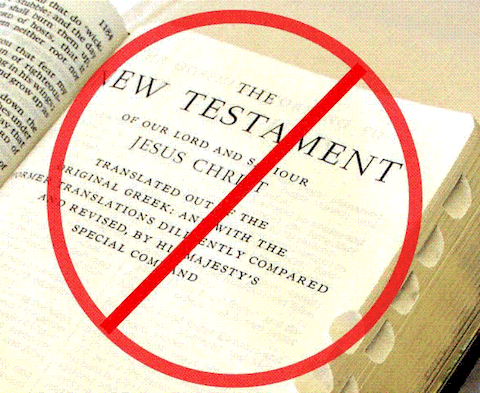
1001 Errors in the Christian Bible
Home
Dedication
Matthew
Mark
Luke
John
Acts
Contact Us
John -- Errors 625-631
#625
John 19: (KJV)
26 “When Jesus therefore saw his mother, and the disciple standing
by, whom he loved, he saith unto his mother, Woman, behold thy son!”
John’s Jesus teaches that the natural family relationships are secondary
in importance to the supernatural relationships and violates the commandment
from the Tanakh to honor your parents. But “Matthew’s”
Jesus said he would not violate any law of the Tanakh. Interestingly,
the Synoptics show this anti family behavior as being taught during Jesus’
career while John shows it as brought about by Jesus’ death. The
Synoptics, written earlier, show more emphasis on Jesus’ career and
teachings while “John”, written later, glosses over Jesus’
teachings having instead a long running advertisement for Jesus’
teachings without really explaining what Jesus’ teachings are and
emphasizes Jesus’ death. This also illustrates the hypocrisy of modern
fundamentalism, having a position of emphasizing natural family relationships
when the Christian Bible clearly shows Jesus as deemphasizing natural
family relationships.
# 626
John 19: (KJV)
29 “Now there was set a vessel full of vinegar: and they filled
a spunge with vinegar, and put it upon hyssop, and put it to his mouth.
30 When Jesus therefore had received the vinegar, he said, It is finished:
and he bowed his head, and gave up the ghost.”
Compare to Mark 15: (KJV)
23 “And they gave him to drink wine mingled with myrrh: but he
received it not.”
John’s “Jesus” was drinking while Mark’s “Jesus”
was not. When the police officer in Mel Gibson’s “Passion”
asks Jesus if he’d been drinking “Gibson’s” Jesus
says “Yes and no”.
# 627
John 19: (KJV)
30 “When Jesus therefore had received the vinegar, he said, It
is finished: and he bowed his head, and gave up the ghost.”
Compare to Luke 23: (KJV)
46 “And when Jesus had cried with a loud voice, he said, Father,
into thy hands I commend my spirit: and having said thus, he gave up the
ghost.”
“John’s” Jesus and “Luke’s” Jesus have different
last words.
# 628
John 19: (KJV)
31 “The Jews therefore, because it was the preparation, that the
bodies should not remain upon the cross on the sabbath day, (for that
sabbath day was an high day,) besought Pilate that their legs might be
broken, and that they might be taken away.”
The underlying Greek for “their legs might be broken, and that they
might be taken away” is “might be broken their legs and taken
away”. Grammatically, the verb “taken away”, refers to
the subject “legs”. All modern translations add “bodies”
or “they” to avoid this awkward grammar. Advice to modern Christian
translators, just translate what it says and don’t add words to avoid
awkward grammar putzes.
# 629
John 19: (KJV)
30 “When Jesus therefore had received the vinegar, he said, It
is finished: and he bowed his head, and gave up the ghost.
31 The Jews therefore, because it was the preparation, that the bodies
should not remain upon the cross on the sabbath day, (for that sabbath
day was an high day,) besought Pilate that their legs might be broken,
and that they might be taken away.
32 Then came the soldiers, and brake the legs of the first, and of the
other which was crucified with him.
33 But when they came to Jesus, and saw that he was dead already, they
brake not his legs:”
Compare to Mark 15: (KJV)
37 “And Jesus cried with a loud voice, and gave up the ghost.
38 And the veil of the temple was rent in twain from the top to the bottom.
39 And when the centurion, which stood over against him, saw that he so
cried out, and gave up the ghost, he said, Truly this man was the Son
of God.”
“John’s” soldiers didn’t know Jesus was dead until
they went to brake his legs. “Mark’s” soldier knew Jesus
was dead right after he cried out.
# 630
John 19: (KJV)
34 “But one of the soldiers with a spear pierced his side, and
forthwith came there out blood and water.”
For some reason modern Christian translations are using “pierced”
to death. The underlying Greek word means “stabbed at” or “picked
at”. The context is that a soldier is checking to see if Jesus is
dead or not. Would you kill someone in order to find out if they were
still alive?
# 631
John 19: (KJV)
36 “For these things were done, that the scripture should be fulfilled,
A bone of him shall not be broken.”
Where? Ironically “John’s” Jesus does maintain a sort of
perfection here, not fulfilling a single Messianic prophecy from the Tanakh.
My Auntie has also fulfilled all of the Messianic prophecies except for
the ones she hasn’t fulfilled yet.